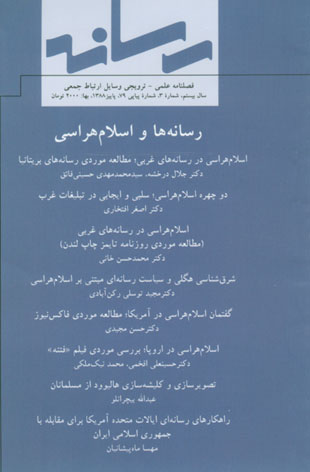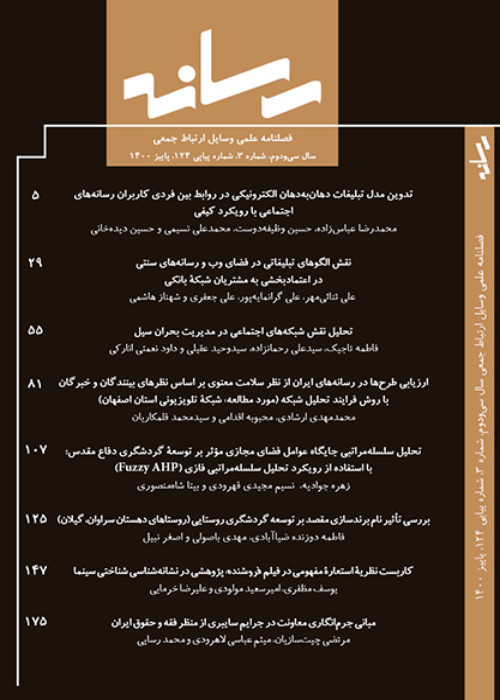فهرست مطالب

فصلنامه رسانه
سال بیستم شماره 3 (پیاپی 79، پاییز 1388)
- 304 صفحه، بهای روی جلد: 20,000ريال
- تاریخ انتشار: 1388/08/11
- تعداد عناوین: 10
-
-
صفحه 5
-
Page 9Islamophobia is a problem with different Political, Social and cultural dimensions. Some western powers are using media as means by which they can spread the waves of Islamophobia. It is worth noting that this instrumental usage of media by those who hold power in the west is not just a matter of conspiracy theory since many western theories also accept this fact. According to some researches done in this area, British media are enhancing the tendencies stems from Islamophobia in their society. In doing this they take advantage of many tools and throughout the time the level of their anti-Islam and anti-Muslim activities are increasing. The weak presence of Muslims in the media sector in Britain has helped the fast and powerful growing of Islamophobia waves in this country. This article is trying to explain this issue in British media.Keywords: Islamophobia, Muslims, Western Media, Britain
-
Page 29Although the project of Islamophobia is mainly known by the practice of other-making of the west against Islamic World, yet the main unanswered questions here is why this perspective, in spite of its shaky rational foundation has been restively successful.This article is an attempt to answer this question using a pattern which is defined in the framework of image-making theory. The findings of this research implies that Islamophobia has two different but complementary faces. The first one is the external one which is negative and the other one is the internal one which is positive. This article agues that the main reason for the success of negative Islamophobia is the formation of positive version of it.Keywords: Islam, Islamophobia, West. Islamic World, Image, Making
-
Page 45In recent decades confrontation between West and Islam has entered a new phase in terms of its new dimensions and also in terms of the means and tools used in this battle. Media has always been a very important and effective means used by the west in its confrontation with Islam. Portraying a very dark, violent and reactionary image of Islam and its teachings, together with presenting an unreal, negative, horrible and backward picture of Islamic societies has been the most important functions of western media in this regard. This article is an attempt to investigate the role and practice of the Times of London newspaper as a case-study. I doing this, the author will carry out a content analysis study of different issues of the newspaper between 2004 and 2010 reviewing its headlines, news reports, interviews and editorials and showing how Islamophobia has been the core of its policy.Keywords: Islam, West, Media, The Times of London, Islamophobia
-
Page 57Orielantalism is a dominated discourse which is based upon an image of “others” from eastern societies in accordance with western assumptions and expectations in the academic studies framework in history, anthropology, sociology and literature. This discourse has also produced its own media-politics too. The origin of this discourse is certain lines of thoughts of modern philosophy specially that of Hegel. In twentieth century Orientalism also looks at the outside world based on Hegelian foundation. According to Hegel the people in eastern societies doesn’t know the fact that fact that Human soul is absolutely free and since they doesn’t know this fact they are not free.Such a view more or less is dominated on the mentality of western thinkers and this is why they see Islam an “OTHER” and a threat towards freedom. The western strategies on media nowadays are formed based on such a view created and enhanced Islamophobia.Keywords: Orientalism, Christianity, Islamophobia, Western, Oriented, Hegelian Philosophy of History, Media Strategy
-
Page 71Although Islamophobia is a new word but in practice it has a long history. To present a terrible image of Islam including the holy text from which it derives, the shari’a, and Muslims entered in a new phase after September 11th events. If the supporters of “war on terrorism” assume media as the oxygen for terrorism, we can assume the same role for media when it comes to Islamophobia. Studies show that even prior to 9/11 there were some certain types of Islamophobia. At the time Ismaophobia was used to isolate Muslims in western societies and to put pressure on Islamic world to change the behavior of Islamic governments. But now using the slogan of “war on terrorism” Islamophobia paved the way for regime change in Iraq and Afghanistan. This article, by using a Foucaultian Discourse Analysis, will attempt to analyze the Islamophobia discourse arguing that it is the result of American neo-conservatives in an attempt to dominate the world. In doing this, the author will evaluate Fox News role and shows how channels like this do not want to reflect the realities as they are but rather they reflect the information after filtering them according to their views and priorities.Keywords: Islamophobia, America, Terrorism, September 11, Fox News
-
Page 87Islamophobia is a designed project planned by western governments to be used against the increasing tendency towards Islam in the west. This project is done by accusing Islam of terrorism and introducing Islam as a serious threat to the west and other religions. After the 9/ 11 events this project has been followed by two other components namely shiaphobia and Iranophobia. This articl briefly evaluates the different stages of Islamophobia in the west and looks at the positions and actions of western governments and authorities in this regard. It will then focus on TV programs of two German TV channels namely ZDF and ARD and finally will have a critical and analytical look at the Fitna film.Keywords: Islamophobia, Orientalists, Fundamentalism, Islam, Terrorism, Netherlands, Fitna Film
-
Page 115We have been witness to highlighting of the image of Muslims in the western media in general and in Hollywood in particular. This image has been an unpleasant, unfair, exaggerated and stereotyped one according to majority of Muslims, and has been a threatening, extremist, chaotic, and anti-participatory one according to the western audience. This article is an attempt to investigate the way that Islam and Muslims have been introduced in Hollywood movies. This article will analyze on five specific movies made in 1980s, 1990s, and 2000. In this investigation clarification of media-reintroducing and orienltalism will be used as theoretical framework.Keywords: Islam, Muslims, Cinema, Hollywood, Orientalism, Re, introducing
-
Page 147Although Islamophobia and perceiving it as a threat is deep rooted in the relationship between West and Islam, yet the 9 / 11 events and accusing Islamists of carrying out the attacks was a turning point in this regard. The highlight of the opposing Islam in this new era, the Importance the role of traditional and modern media in this negative perception of Muslims and the effects of digital revolution changed not only the nature of political communication but also the nature of wars. Based on this assumption one cab say that hostility and war towards Islam is happening in both conventional media and modern cyber space. The frontrunners of the western civilization did their best to portray a negative and violent image of Islam and Muslims by composing the symbol-making and pattern-making power of traditional media with the potentials of modern media such as high speed and its ability that go beyond time & space. Thus this article attempts to evaluate the roots and dimensions of the west hostility under leadership of the US, towards Islamic world and Islamic republic of Iran exploring the mechanisms they use to confront Iran.Keywords: Media War, Western Hostility towards Islam, Media, Image of Muslims, Virtual Social Networks


